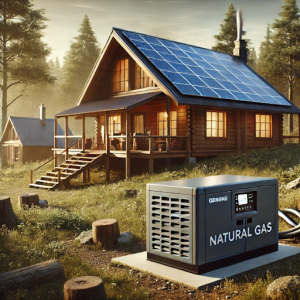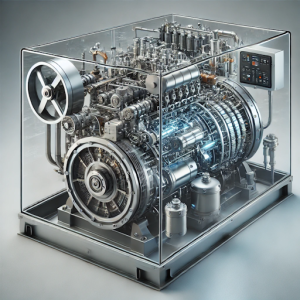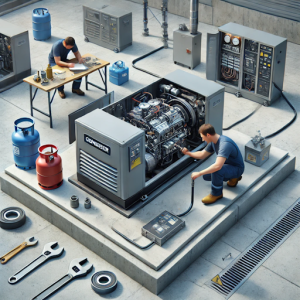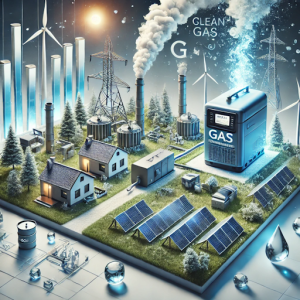Discover How Natural Gas Generators Enhance Sustainable Off-Grid Living
Natural gas generators emerge as a top-tier solution for those seeking a dependable energy source for their homes or cabins situated in remote locales. Grasping the various power generation methods is essential for embarking on a successful off-grid adventure. The unique benefits of natural gas generators, such as their reliability, cost-effectiveness, and environmentally friendly characteristics, render them a compelling choice for off-grid living enthusiasts who value sustainability and efficiency in their energy solutions.
In a world increasingly driven by technology, the allure of off-grid living captivates many. Whether motivated by the desire for sustainability, independence, or the pursuit of a self-sufficient lifestyle, disconnecting from traditional power grids can be rewarding. Off-grid energy solutions empower you to harness energy from renewable sources or alternative fuels, allowing for a comfortable lifestyle that relies less on conventional electricity and more on innovative, sustainable practices.
Equipping yourself with the right knowledge and preparation enables you to integrate a natural gas generator into your off-grid lifestyle effortlessly, ensuring that your essential power needs are consistently met with a reliable energy source. This article delves into the myriad benefits of natural gas generators, clarifies their operation, and highlights critical considerations for selecting and installing them effectively in your off-grid setup.
 Key Takeaways for Maximizing Your Off-Grid Power Solutions
Key Takeaways for Maximizing Your Off-Grid Power Solutions
- Utilizing off-grid power solutions allows you to free yourself from conventional energy sources, making them indispensable for remote living or during unexpected power disruptions.
- Natural gas generators deliver reliable and efficient energy production, with emissions significantly lower than those of diesel or gasoline generators.
- These generators function by combusting natural gas to create mechanical energy, which is then converted into electrical energy through a generator mechanism.
- Choosing a natural gas generator requires careful evaluation of factors like power output, fuel efficiency, and maintenance requirements to ensure optimal energy performance.
- Proper installation and routine maintenance are crucial for the safe and efficient operation of your natural gas generator, ensuring longevity and reliability.
Uncover the Remarkable Benefits of Natural Gas Generators for Consistent Power Generation
One of the standout features of natural gas generators is their remarkable reliability. By opting for a natural gas generator to meet your off-grid energy demands, you can depend on a consistent power supply tailored specifically to your requirements. Unlike solar panels or wind turbines, which can be adversely impacted by weather changes, natural gas generators provide stable energy output that remains unaffected by external factors.
This reliability is especially vital for individuals who rely on electricity for essential functions such as heating, refrigeration, or operating medical devices. The assurance that your generator will deliver power when you need it most contributes to a sense of security and peace of mind. Additionally, natural gas generators offer substantial cost savings that enhance their appeal.
Although the initial cost may be higher than some alternative off-grid solutions, the long-term savings can be considerable. Natural gas is often more affordable than gasoline or diesel fuel, leading to lower operational costs over time. Moreover, natural gas generators typically have less demanding maintenance needs compared to other types, allowing you to conserve both time and resources while enjoying a reliable energy supply.
 Understanding the Operational Mechanics Behind Natural Gas Generators
Understanding the Operational Mechanics Behind Natural Gas Generators
Natural gas generators work by converting the chemical energy contained in natural gas into electrical energy through a combustion process. When the generator is activated, natural gas is mixed with air and ignited in the engine’s combustion chamber. This ignition generates high-pressure gases that drive the engine’s pistons, which ultimately rotate the generator’s rotor to produce electricity.
This operational process is notable for its efficiency and cleanliness compared to other fossil fuel options. A crucial component of a natural gas generator is its fuel system, typically featuring a regulator that controls gas flow to ensure optimal performance. Modern natural gas generators are equipped with advanced functionalities, including automatic start/stop capabilities and remote monitoring features.
These innovations significantly enhance user convenience, allowing you to manage your power supply more effectively and simplifying your off-grid lifestyle.
Essential Considerations When Selecting the Right Natural Gas Generator
| Consideration | Description |
|---|---|
| Power Output | Evaluate the generator’s power output needs based on the appliances and equipment you intend to operate. |
| Fuel Type | Choose natural gas as your preferred fuel source for its clean-burning and cost-efficient qualities. |
| Size and Portability | Select a generator size and portability features that match your available space and mobility requirements. |
| Noise Level | Assess the generator’s noise output to ensure it aligns with the acceptable standards for your living environment. |
| Start-up Mechanism | Choose between manual or automatic start-up options based on your convenience and usage frequency. |
When selecting a natural gas generator for your off-grid setup, it is essential to consider several key factors. First, evaluate your power requirements. Calculate the total wattage needed to support your essential appliances and devices, ensuring that the generator you choose can handle the necessary load effectively.
It is advisable to opt for a generator with a slightly higher capacity than your calculated needs to accommodate any sudden spikes in power demand. Additionally, consider the generator’s portability and installation requirements. If you plan to move your generator frequently or use it in various locations, look for a lightweight model that is easy to transport.
Furthermore, contemplate whether you prefer a stationary installation or a portable unit that can be easily set up based on your needs. Lastly, take note of the generator’s noise level; quieter models can significantly enhance your off-grid experience by minimizing disruptions and preserving the peacefulness of your natural surroundings.
 Implementing Effective Installation and Maintenance Practices for Natural Gas Generators
Implementing Effective Installation and Maintenance Practices for Natural Gas Generators
The installation process for a natural gas generator requires meticulous planning and execution to ensure both safety and operational efficiency. Begin by selecting an appropriate location for your generator, ensuring compliance with local regulations and safety guidelines. Ideally, this site should be well-ventilated and distanced from flammable materials to mitigate risks.
You may need to install a concrete pad or platform to stabilize and protect the generator from moisture damage. Once the ideal location is identified, connect the generator to your natural gas supply line. If you are inexperienced with gas line installations, it is advisable to seek professional assistance to guarantee compliance with all safety standards and regulations.
After establishing the fuel connection, set up the necessary electrical connections to integrate the generator into your home’s electrical system. Regular maintenance is crucial for ensuring the smooth operation of your generator. This includes routine checks of oil levels, air filter replacements, and spark plug inspections to sustain peak performance and reliability.
Comparative Analysis: Natural Gas Generators Versus Alternative Off-Grid Power Solutions
When analyzing the costs associated with off-grid energy solutions, it is vital to conduct a detailed comparison between natural gas generators and other alternatives like solar panels and diesel generators. While solar energy systems have gained popularity for their renewable nature, they typically require a significant upfront investment in panels, batteries, and inverters. Additionally, solar systems may struggle to provide adequate power during cloudy weather or at night without sufficient battery storage.
On the other hand, diesel generators are recognized for their reliability, but they come with higher fuel costs and more frequent maintenance compared to natural gas generators. Given the volatility of diesel fuel prices, natural gas generally presents a more stable and often less expensive option in many regions. A comprehensive long-term cost analysis reveals that natural gas generators typically offer a more economical solution for those pursuing off-grid living.
 Assessing the Environmental Impact of Natural Gas Generators in Off-Grid Energy Solutions
Assessing the Environmental Impact of Natural Gas Generators in Off-Grid Energy Solutions
As you evaluate your off-grid energy options, it is crucial to consider their environmental impact. Natural gas is often touted as a cleaner alternative to other fossil fuels like coal or oil, primarily due to its lower carbon emissions during combustion. By choosing a natural gas generator, you can significantly reduce your carbon footprint while enjoying reliable energy for your off-grid lifestyle.
However, it is important to recognize that natural gas remains a fossil fuel, and its extraction can lead to environmental consequences. Methane leaks during extraction and transportation pose substantial concerns regarding greenhouse gas emissions. To address these issues, prioritize sourcing natural gas from reputable providers committed to sustainable practices and environmental responsibility.
Moreover, incorporating renewable energy sources alongside your natural gas generator can further demonstrate your dedication to environmental sustainability and responsible energy consumption.
Inspiring Real-Life Examples of Off-Grid Power Solutions Using Natural Gas Generators
Examining real-world examples can provide valuable insights into how natural gas generators have been successfully implemented in off-grid living contexts. For instance, numerous rural homeowners have transitioned to using natural gas generators as their primary energy source after experiencing frequent outages from traditional utility services. The introduction of these generators has provided them with energy independence while ensuring a steady electricity supply for heating, cooling, and essential appliances.
Another noteworthy case study involves remote cabins that depend on natural gas generators for seasonal use. These cabins, often situated in isolated locations, lack access to conventional power sources. Natural gas generators enable cabin owners to enjoy modern conveniences such as refrigeration and lighting without losing their connection to the surrounding natural environment.
These success stories illustrate how natural gas generators can effectively support off-grid living, providing comfort and reliability. As you embark on your off-grid journey, consider the extensive benefits that natural gas generators offer. From their reliability and cost-effectiveness to their relatively low environmental impact, these generators can play a critical role in achieving energy independence.
By carefully selecting the right model for your energy needs and following proper installation and maintenance protocols, you can smoothly transition into an off-grid lifestyle powered by natural gas.
Addressing Frequently Asked Questions About Natural Gas Generators
What characterizes a natural gas generator for off-grid applications?
A natural gas generator for off-grid living is a power generation system that utilizes natural gas as its fuel source to produce electricity in remote locations where access to the main power grid is limited or non-existent.
How does a natural gas generator function in off-grid scenarios?
A natural gas generator designed for off-grid applications operates by combusting natural gas within an internal combustion engine. This process generates mechanical energy, which is then converted into electrical energy through a generator. The electricity produced can power various appliances, equipment, and lighting in off-grid settings.
What are the primary benefits of employing a natural gas generator for off-grid living?
Key advantages of using a natural gas generator for off-grid living include:
– Lower fuel costs compared to diesel or gasoline generators
– Cleaner combustion leading to reduced emissions
– Continuous fuel supply sourced from natural gas pipelines
– Decreased maintenance needs in comparison to other fuel types
What factors should be considered when using a natural gas generator for off-grid living?
Important considerations when utilizing a natural gas generator in off-grid scenarios include:
– Availability of natural gas supply in your area
– Initial installation and equipment costs
– Regular maintenance and servicing requirements
– Environmental implications and adherence to emissions regulations
Is the use of a natural gas generator off-grid feasible for both residential and commercial purposes?
Natural gas generators intended for off-grid use are suitable for a range of applications, including residential and commercial. They are commonly utilized in remote homes, cabins, farms, and small businesses that lack connectivity to the main power grid.
The post Natural Gas Generators for Off-Grid Power Solutions appeared first on Survival Bite.
The Article Natural Gas Generators: Your Off-Grid Power Solution Was Found On https://limitsofstrategy.com


It’s fascinating to consider how natural gas generators are becoming key players in the off-grid living movement. I’ve been researching different energy solutions for my own escape to a cabin in the woods, and I find the balance of reliability and sustainability you mention particularly intriguing. Natural gas seems to strike that necessary chord between being a dependable energy source and having a smaller environmental footprint compared to traditional fossil fuels.
I completely understand where you’re coming from with the allure of natural gas generators for off-grid living. It really does seem to find that sweet spot between reliability and a somewhat reduced environmental impact compared to traditional fossil fuels. I’ve been exploring similar options for a potential retreat myself, and it’s fascinating to dive into not just what works best for energy, but also how those choices can affect our overall lifestyle.
I recently read something that dives into the pros and cons of solar power, which seems like a great complement to your research on energy solutions for off-grid living—it’s interesting to see how it compares to natural gas.
‘Solar Power: Key Advantages and Disadvantages Uncovered’
https://ishevents.org/solar-power-key-advantages-and-disadvantages-uncovered/.
It’s great to hear you’re diving into energy solutions for your cabin in the woods. The balance you’re looking for between reliability and sustainability is definitely a crucial factor. Natural gas generators really do offer a practical approach for those of us wanting to step off the grid without totally sacrificing comfort or convenience.
Speaking of the delicate balance in energy solutions, I recently read about how waste impacts marine life and ecosystems, which adds another layer to our understanding of sustainable living.
‘Waste’s Impact on Marine Life and Ecosystems’
https://ishevents.org/wastes-impact-on-marine-life-and-ecosystems/.
Your exploration of natural gas generators in the context of off-grid living resonates deeply with the growing movement towards sustainable practices. I’ve recently been diving into the lifestyle myself, drawn by the promise of greater self-sufficiency and the chance to minimize my carbon footprint. The blend of reliability and cost-effectiveness that natural gas offers makes it an appealing choice for those of us navigating the complexities of alternative energy sources.
It’s great to hear that you’re exploring off-grid living! The journey toward self-sufficiency can be really rewarding, and it’s interesting how many people are beginning to realize the benefits of alternative energy sources. Natural gas generators have a solid reputation for reliability, which is essential when you’re stepping away from the grid.
Natural gas generators really are like the Swiss Army knife of off-grid living—reliable, versatile, and cost-effective! I’ve dabbled in some off-grid projects myself, and while my solar panels were great for sunny days, they left me in the dark during those stormy nights. It turns out, trying to binge-watch a thriller series on a solar-charged tablet doesn’t quite hit the same as having some gas-powered backup.
It sounds like you’ve had quite the experience with off-grid living! I can totally relate to that struggle of relying solely on solar power. Those gloomy days really make you appreciate having a backup option. It’s interesting how our entertainment habits can influence our energy needs, though—who would’ve thought binge-watching would involve so much planning when it comes to energy source?